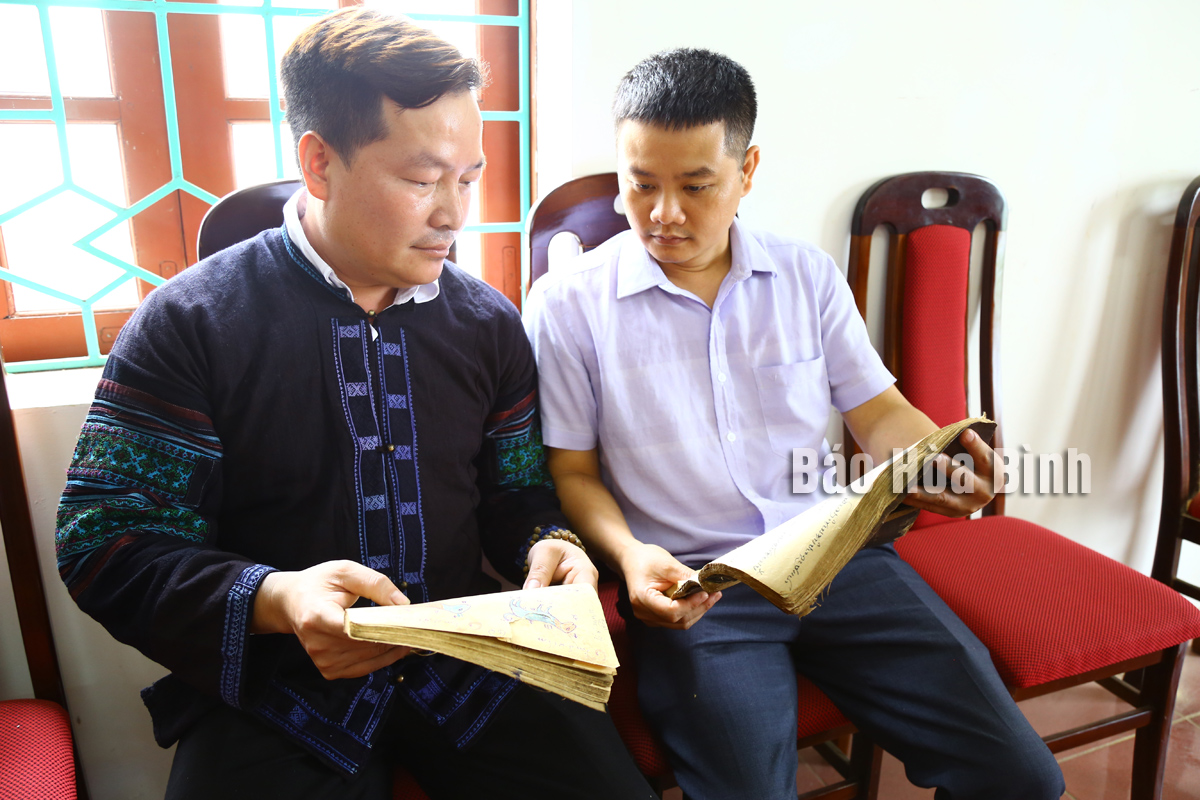
In Muong Chieng commune, Da Bac district, many people know Sa Van Cam, who is dedicated to preserving and promoting ancient Tay script. He has collected, documented and opened classes to teach this script, contributing to the preservation of the Tay ethnic cultural values in Muong Chieng commune and Hoa Binh province.
Sa Van Cam (left), a resident of Muong Chieng commune, Da Bac district, introduces books on ancient Tay scripts that he has preserved and promoted.
Born and grown up in Muong Chieng, where Tay ethnic group makes up over 70% of the population, Cam has accumulated extensive knowledge about Tay culture, including its ancient script. He said that the ancient Tay script has been preserved and handed down through generations. However, in modern times, many cultural values are fading, especially among the youth. To encourage the local Tay community and students to learn and write in their native script, he has studied and set up classes to preserve and promote the Tay language and writing.
Since 2010, Cam has organised seven classes for ancient Tay script, attracting over 200 learners from Muong Chieng and surrounding areas. Notably, in 2017, the Vietnam Institute of Linguistics in Hanoi collaborated him to offer a class on ancient Tay script and held a calligraphy competition in Muong Chieng, with Cam as the instructor. The same year, the Cau Muong festival was held in the commune to promote ancient Tay script to visitors.
Cam held that ancient Tay script differs significantly from the modern Thai script. He collected ancient books passed down to him by his ancestors to compile books and lesson plans to teach the people the Tay language. Despite financial difficulties in running these classes, his passion for imparting ancestral knowledge drives him to continue.
Cam has actively collaborated with the local folk culture club to maintain cultural and artistic activities while teaching ancient Tay script to its members. Many learners in his classes have become proficient in reading and writing the script. Currently, Cam's classes have over 30 attendees who learn three times a week at the community centre in Chieng Cang village.
Nguyen Quang Hieu, Deputy Head of the provincial Emulation - Commendation Commission, highlighted that Cam's model of "preserving and promoting the identity of ancient Tay script" provides significant social benefits by safeguarding and enhancing the Tay script and culture. It helps people better understand the rich and unique culture of the Tay ethnic group, he added. Cam's model has the potential to create a ripple effect and inspire broader influence across the province.
In recognition of his contribution to collecting folk culture, the provincial People’s Committee recognised Cam’s model as a provincial-level advanced example this year.
Phong Phu commune, Tan Lac district of Hoa Binh province, is widely regarded as the cultural heartland of the Muong ethnic group. Among its many traditional communities, Luy Ai hamlet (formerly Ai hamlet) stands out as a rare location where the customs and way of life of the Muong Bi people remain largely intact.
The Truong Kha temple festival, a distinctive cultural event held every three years in Vu Ban township, Lac Son district, returned recently with vibrant rituals and folk traditions of the Muong people. Located next to the Buoi River in the Muong Trao fields, the Truong Kha Temple is dedicated to the three Kun Dol deities, revered for teaching farming techniques, irrigation, weaving, and protecting the harvest.
The demand for spaces serving community activities of residents in various areas across Hoa Binh city has been satisfied as local cultural houses now feature modern, spacious facilities thanks to the effective implementation of Resolution No. 49/NQ-HDND issued on December 28, 2021 by the city People's Council, which approved the plan for reorganising, converting, and allocating land for the construction, repair, and expansion of cultural houses in Hoa Binh’s villages and residential areas until 2025.
At the end of May, the Hoa Binh Provincial Ethnic Arts Troupe organized a series of performances for residents in Region 2 and Region 3 communes across the province. Bringing art to ethnic communities in remote, isolated, and especially disadvantaged areas has become a meaningful activity. These are not merely artistic performances but also journeys to disseminate cultural values, enrich spiritual life, and contribute to preserving the cultural identity of ethnic minorities.



